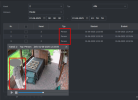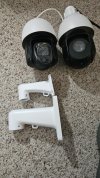Just in general terms: Now that Dahua has sold Imou, they no longer have any products for the Soho market, so with the PT series they have once again attempted to market some products with cheaper hardware and "stripped down" software at a lower price. They have tried this several times in recent years without success, and the last try was the Dahua Picoo series, which is still available in some countries. Now without Imou, however, it has become even more necessary, because the Soho market in particular is booming, and average customers are not willing to spend 200, 300, or even more euros on an IP camera. Furthermore, competitors have caught up in terms of hardware and software quality, so Dahua has lost more and more ground.
In my opinion, Dahua has always been oriented towards Hikvision for years, and everything Hikvision did was also done by Dahua. It's just that Dahua seems to have lost sight of the market and its competitors. If you focus solely on business customers and higher-priced products, and only serve the market through distributors and specialist retailers, it can quickly happen that competitors like Reolink suddenly become more well-known and popular with customers. Even if the product quality may not be as high as Dahua's.
Added to this, of course, is the fact that in some countries Dahua products are no longer allowed to be sold, which has led to a global decline in the availability of Dahua products in the Soho market. Here in Germany, for example, Amazon itself no longer offers Dahua products - except for some remaining stock that is probably still in stock. I used to buy two of my Dahua cameras from Amazon, for example, because they were on sale there for the same price as if I had ordered them directly from China through Ali. Here in Germany, Reolink now dominates the Soho market, followed by TP-Link. Dahua hardly plays a role anymore, which I find quite a shame. Just a few years ago, I also was perfectly willing to pay €400 or €500 for something like a Dahua
SD49225XA-HNR if it suited my intended use and location. Nowadays, however, you can achieve the same result with competitor products for half the price. That their product might not be quite as high-quality and/or the software might have a few more bugs is something you're willing to accept.
It's clear that there are other private users with completely different requirements and locations for IP cameras, but the general public and the Soho market simply don't need a PTZ camera with a 25x zoom and the corresponding high-quality hardware to deliver razor-sharp images, perhaps even in color, even at night.

I personally don't need any more or new IP cameras here in the foreseeable future, but I'm curious to see how things continue with Dahua in the coming years. I hope that affordable Dahua products will continue to be available and that Dahua won't just offer correspondingly more expensive products for the business sector. Otherwise, I might have to switch to TP-Link, for example.














 I personally don't need any more or new IP cameras here in the foreseeable future, but I'm curious to see how things continue with Dahua in the coming years. I hope that affordable Dahua products will continue to be available and that Dahua won't just offer correspondingly more expensive products for the business sector. Otherwise, I might have to switch to TP-Link, for example.
I personally don't need any more or new IP cameras here in the foreseeable future, but I'm curious to see how things continue with Dahua in the coming years. I hope that affordable Dahua products will continue to be available and that Dahua won't just offer correspondingly more expensive products for the business sector. Otherwise, I might have to switch to TP-Link, for example.